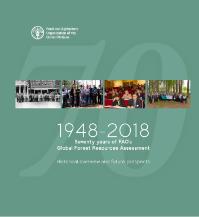Focal point
Location
The Food and Agriculture Organization of the United Nations leads international efforts to defeat hunger. Serving both developed and developing countries, FAO acts as a neutral forum where all nations meet as equals to negotiate agreements and debate policy. FAO is also a source of knowledge and information. We help developing countries and countries in transition modernize and improve agriculture, forestry and fisheries practices and ensure good nutrition for all. Since our founding in 1945, we have focused special attention on developing rural areas, home to 70 percent of the world's poor and hungry people.
Members:
Resources
Displaying 521 - 525 of 5074Seventy years of FAO's Global Forest Resources Assessment (1948-2018)
The Global Forest Resources Assessment of the Food and Agriculture Organization of the United Nations (FAO) celebrates its 70th Anniversary in 2018. FAO's forestry department whishes to commemorate this important occurrence with a special publication on the history of the past 70 years of Global Forest Resources Assessemnt.
Lessons learned from five years of nature conservation and development in South Pacific Islands
The Food and Agriculture Organization of the United Nations (FAO) with financing from the Global Environment Facility (GEF) under the Pacific Alliance for Sustainability implemented the project “Forestry Conservation and Protected Area Management” in cooperation with the Governments of the Pacific Island Countries Fiji, Niue, Samoa and Vanuatu from 2012 until 2018.
Sustainable management of Miombo woodlands
The Miombo woodland is a vast African dryland forest ecosystem covering close to 2.7 million km2 across southern Africa (Angola, Democratic Republic of the Congo, Malawi, Mozambique, Tanzania, Zambia and Zimbabwe). The woodlands are characterized by the dominance of Brachystegia species, either alone or in association with Julbernardia and Isoberlinia species. It is estimated that the woodlands – through their numerous goods and services which include various non-wood forest products (NWFPs) (e.g.
Informe del Diálogo sobre Directrices Voluntarias sobre la Gobernanza responsable de la Tenencia de la Tierra, la Pesca y los Bosques
informe sobre los hallazgo del “Diálogo sobre Directrices Voluntarias sobre la Gobernanza responsable de la Tenencia de la Tierra, la Pesca y los Bosques” sostenido en la ciudad Panama, Panama, 27 - 29 de noviembre 2017.
Advancing the role of natural regeneration in large-scale forest and landscape restoration in the Asia-Pacific region
There are numerous global, regional, national and even subnational targets for increasing forest area and forest restoration. In light of these global targets and emerging ambitious national commitments, it is imperative to develop low-cost strategies and techniques for landscape restoration. The most widely used restoration strategies involving planting of tree seedlings are often costly and their application for restoring vast expanses of degraded forest lands in the region may be limited.











